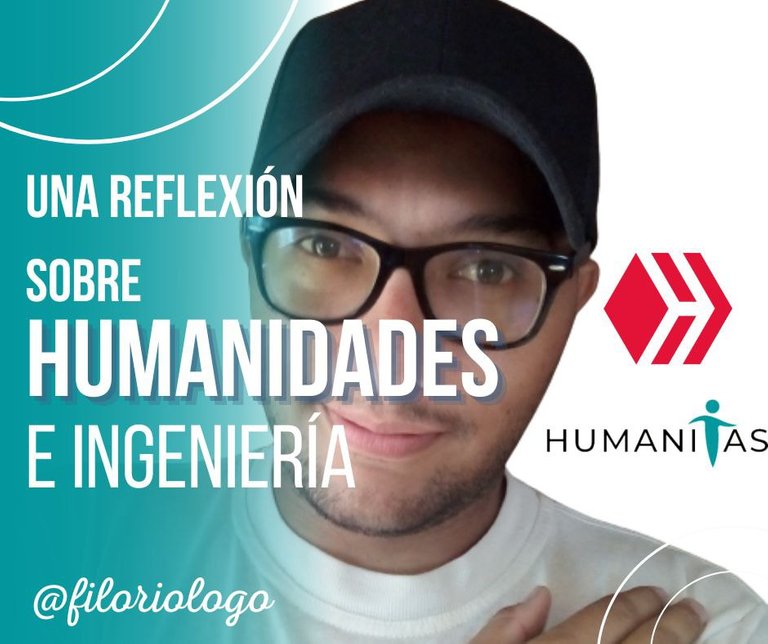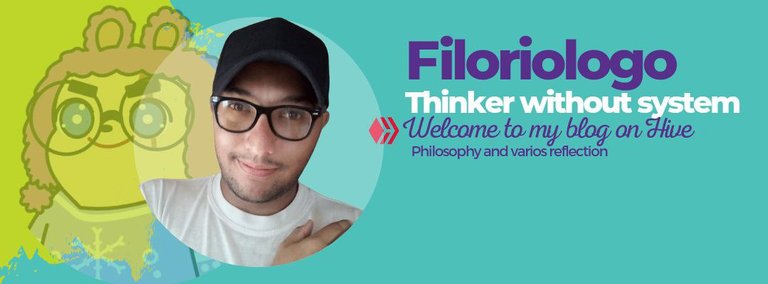A reflection on humanities and engineering [ENG-ESP]

Throughout time, academia has been dedicated to specialize more and more knowledge, making disciplines sectorized and each time it is an extremely specialized area. This makes humanistic disciplines go one way and scientific disciplines another, and in large universities we see how there are buildings or deanships dedicated to science and, on the other hand, there are deanships only for humanities. I think that this partialization of knowledge has caused the illusion that these areas of knowledge walk separately.
Far from it, both science and humanities walk on the same path, the difference is not their object of study, but the way of looking at reality, which separately are only partialities of reality, but when we try to unify the perspectives we realize that they walk in harmony.
In this opportunity I want to outline a reflection that harmonizes scientific and humanistic knowledge, taking advantage of this community proposal. If you haven't heard about it, just click here and get involved. In short it is nothing more than outlining your perspective, your opinion about the relationship of engineering and human development and aesthetics.
The most important philosopher of the 20th century (at least he is for me), Martin Heidegger stated that "Science does not think", but, far from wanting to promote some outrage from the devotees of science, what Heidegger tried to do was to outline a point of view that at least I find interesting. It is that, strictly speaking, the task of thinking requires leisure and careful reflection, and it is not that science lacks these attributes, but its nature to inquire, to seek, to test, to try, to experiment and to experiment. Science is restless, thinking a bit calmer. But, this does not make them go their separate ways, since both currents try to promote human development.
In the times of the Platonic academy they were not differentiated knowledge, the humanistic and the scientific were given in the same environment, today it seems that we point again to that trend of unifying careers. I think we need more holistic knowledge. Technological progress in recent decades has been by leaps and bounds, and I believe that reflective thinking such as ethics has tried to keep pace admirably. Engineering in recent years has developed technologies that a few decades ago were unthinkable. This makes us contemplate the enormous creative capacity that we human beings have, and that we have an ability to solve problems like no other being, but at the same time that we solve some, we create others, and this has happened because there has not been a holistic training, although there are also other factors this lack of unifying the sciences and humanities are an aspect to consider.
We are creating ethical problems in the technological field because we do not stop to think with humanistic criteria. In this case, Heidegger was right, "science does not think", making the unification of knowledge imperative. Perhaps, think of new university careers such as computer engineering and bioethics. Philosophy and design engineering. Although it is a matter for another reflection, it is no secret that academia needs to be restructured.
All knowledge is in context, it is in relation to other knowledge. There is no isolated knowledge. It is a matter of creating interdisciplinary disciplines in order to reflect society and create new, more human technologies. I liked to try to outline my point of view on how humanities and engineering go hand in hand, well sciences in general, engineering is nothing more than applied science to try to solve problems and improve life and its conditions in its multiple fields.

VERSIÓN EN ESPAÑOL
Humanidades e ingeniería
La academia a lo largo del tiempo se ha dedicado a especializar cada vez más los conocimientos, haciendo que se sectoricen las disciplinas y cada vez sea un área extremadamente especializada. Haciendo que disciplinas humanísticas vayan por un camino y las científicas por otro, y en grandes universidades vemos como hay edificios o decanatos dedicados a la ciencia y, por otro lado, hay decanatos únicamente para humanidades. Pienso que esta parcialización del saber a causado la ilusión de que estas áreas del saber caminan por separado.
Lejos de ser así, tanto la ciencia como las humanidades caminan en un mismo sendero, la diferencia no es su objeto de estudio, sino el modo de mirar la realidad, que de manera separada son solo parcialidades de la realidad, pero cuando intentamos unificar las perspectivas nos damos cuenta de que se camina en armonía.
En esta oportunidad quiero esbozar una reflexión que armonice los saberes científicos y humanísticos, aprovechando esta propuesta de la comunidad. Si no te has enterado de qué va, solo pincha aquí y anímate a participar. En resumen no es otra cosa que esbozar tu perspectiva, tu opinión acerca de la relación de la ingeniería y el desarrollo humano y la estética.
El filósofo más importante del siglo XX (por lo menos lo es para mí), Martin Heidegger afirmó que “La ciencia no piensa”, pero, lejos de querer promover algún escándalo por parte de los devotos de la ciencia, lo que intentó Heidegger fue esbozar un punto de vista que por lo menos a mí me parece interesante. Es que, en sentido estricto, la tarea de pensar requiere ocio y reflexión detenida, y no es que la ciencia carezca de estos atributos, sino que su naturaleza de indagar, buscar, probar, experimentar y experimentar. La ciencia es inquieta, el pensar un poco más calmado. Pero, esto no los hace andar por caminos separados, ya que ambas corrientes intentan promover un desarrollo humano.
En los tiempos de la academia platónica no eran saberes diferenciados, lo humanístico y lo científico se daba en un mismo ambiente, hoy en día parece que apuntáramos de nuevo a esa tendencia de unificar carreras. Creo que necesitamos saberes más holísticos. El avance tecnológico de estas últimas décadas ha sido a pasos agigantados, y creo que pensamientos reflexivos como la ética ha intentado seguir el paso de manera admirable. La ingeniería de los últimos años ha desarrollado tecnologías que unas décadas atrás era cosa impensable. Eso nos hace contemplar la enorme capacidad creativa que tenemos los seres humanos, y que tenemos una habilidad para resolver problemas como ningún otro ser, pero a la vez que solucionamos unos, creamos otros, y eso ha sucedido porque no ha habido una formación holística, aunque hay también otros factores esta falta de unificar las ciencias y las humanidades son un aspecto a considerar.
Estamos creando problemas éticos en el ámbito tecnológico porque no nos detenemos a pensar con criterios humanísticos. En este caso, Heidegger tenía razón, “la ciencia no piensa”, haciendo imperativo la unificación de saberes. Quizá, pensar en nuevas carreras universitarias tipo Ingeniería informática y bioética. Filosofía e Ingeniería de diseño. Aunque es asunto de otra reflexión, pero, para nadie, es un secreto que, la academia necesita ser reestructurada.
Todo saber es en contexto, es en relación con otros saberes. No hay saber aislado. Se trata de crear disciplinas interdisciplinares con el fin de además reflexionar la sociedad, se creen nuevas tecnologías más humanas. Me gustó intentar esbozar mi punto de vista sobre como las humanidades y la ingeniería van de la mano, bueno las ciencias en general, las ingenierías no son más que ciencia aplicada para intentar resolver problemas y mejorar la vida y las condiciones de esta en sus múltiples ámbitos.
Invito a participar en esta iniciativa a mis amigos @jkalthor y @neoculto

https://twitter.com/FiloRiologo/status/1548445297595916291
The rewards earned on this comment will go directly to the people( @filoriologo ) sharing the post on Twitter as long as they are registered with @poshtoken. Sign up at https://hiveposh.com.
For my part, Heidegger is on the list of philosophers of the twentieth century that I like the least.
He was a self-confessed Nazi who never publicly regretted having been an intellectual who defended and justified the barbarities of Nazism, its science and technology 😠 😞
As for his philosophy, well, his work has been criticized for being very obscure in the sense that it is unintelligible. Mario Bunge considered his work "pseudo-philosophical" and Heidegger, a "charlatan" and anti-scientific intellectual.
I don't agree that today's science and technology have Heidegger to thank for anything, but well, his name is too pompous among the social sciences.
Por mi parte, Heidegger está en la lista de filósofos del siglo XX que menos me gustan.
Fue un nazista confeso que nunca se arrepintió públicamente de haber sido un intelectual que defendió y justificó las barbaridades del nazismo, su ciencia y su tecnología 😠 😞
En cuanto a su filosofía, bueno, su obra ha sido criticada por ser muy oscura en el sentido de que es poco inteligible. Mario Bunge consideró su obra "pseudofilosófica" y a Heidegger, un "charlatán" y intelectual anticientifico.
No estoy de acuerdo en que la ciencia y la tecnología actuales tengan que agradecer a Heidegger nada, pero bueno, su nombre es demasiado pomposo entre las ciencias sociales.
Ciertamente, la ciencia y la tecnología actual no tienen nada que agradecerle a Heidegger, y aunque sobre su persona se pueda decir mucho, de hecho admiro a Heidegger por su obra, más no por su vida. Es cierto, tiene sus detractores y eso es normal, creo que ninguna personalidad medianamente conocida se escapa de ello.
Totalmente respetable tu postura. No estoy de acuerdo con Bunge, en sus consideraciones sobre su obra como pseudofilosófica, aunque sus razones tendrá y eso se respeta. Ahora bien, que consideré charlatán es ya un ataque a su persona y no tiene nada de mérito atacar a la persona, si fue anticientífico no lo sé, pero es una interpretación válida.
Y aunque el Nazismo haya sido un momento terrible para la humanidad, siempre los procesos históricos tiene algo que aportar aunque sean momentos oscuros. Y aunque no nos guste el nazismo, fue gracias a Heidegger que se aceptó al castellano como lengua para hacer filosofía, antes solo se consideraba filosofía, un texto que se escribiera en Alemán, Inglés, Latín o Griego. Ya que Heidegger tuvo un estudiante venezolano, el filósofo Ernesto Mayz Vallenilla y fue él al cual Heidegger permitió traducir al español alguna de sus obras.
¡Gracias por comentar y dejar tu opinión!
!PIZZA
Certainly, science and technology have nothing to thank Heidegger for, and although much can be said about his person, in fact I admire Heidegger for his work, but not for his life. It is true, he has his detractors and that is normal, I think that no moderately known personality escapes it.
Your position is totally respectable. I do not agree with Bunge, in his considerations about his work as pseudo-philosophical, although he will have his reasons and that is respected. Now, that I considered him as a charlatan is already an attack to his person and there is no merit in attacking the person, if he was anti-scientific I do not know, but it is a valid interpretation.
And even if Nazism was a terrible time for humanity, always historical processes have something to contribute even if they are dark times. And although we do not like Nazism, it was thanks to Heidegger that Spanish was accepted as a language to do philosophy, before it was only considered philosophy, a text written in German, English, Latin or Greek. Heidegger had a Venezuelan student, the philosopher Ernesto Mayz Vallenilla, who allowed Heidegger to translate some of his works into Spanish.
Thanks for commenting and leaving your feedback!
You have to read and listen to Bunge and others to learn more about their reasons for calling him a charlatan and anti-scientist. Bunge in particular has opened my eyes as to some things that are almost "preached" in social science faculties about these personalities and, more than anything else, their philosophies. I should write about that 🤔
I agree with you and I would definitely keep Heidegger among the list of the most "influential" philosophers of the last century. I would use that word instead of "important" as the latter word gives more credit than it should :D In the list of favorite intellectuals, on the other hand, I put him at the bottom, just as I would have Hitler at the bottom of the list of favorite leaders.
Interesting fun fact. I will check it out later.
Thanks for your contribution to the STEMsocial community. Feel free to join us on discord to get to know the rest of us!
Please consider delegating to the @stemsocial account (85% of the curation rewards are returned).
You may also include @stemsocial as a beneficiary of the rewards of this post to get a stronger support.
PIZZA Holders sent $PIZZA tips in this post's comments:
filoriologo tipped eniolw (x1)
@jesusalejos(1/10) tipped @filoriologo (x1)
Join us in Discord!
La frase "la ciencia no piensa" nos habla de que por sí sola no tiene un rumbo, y dicho rumbo es el que le damos nosotros los seres pensantes. Creo que podría interpretarse así. No tiene sentido tener tecnología cada vez más avanzada sin un fin que beneficie al ser humano de forma holística o "Integral". Por eso es importante retomar o volver a unir estos saberes con las humanidades, tal como en un principio fue, pero sin dejar de lado los beneficios de las especializaciones. ¡Saludos @filoriologo!
En mi caso es todo lo contrario, siento que necesito acercarme más a lo práctico, a los saberes científicos.
Saludos, cesar
Que interesante tu cuestionamientos sobre la academia, siento que cada día se hace más necesario humanizar las disciplinas y sobre todo hacerlo más común, más cercano, más ameno. Pienso que todas las personas y nuestros aportes son necesarios para el mundo, aunque si van de la mano es mejor.
Está iniciativa me trajo buenas ideas. Ya las preparo.
Totalmente de acuerdo contigo querido amigo las especializaciones de la Academia están matando el saber, lo esclavizan a un área cuando de por sí está llamado a abarcar más que aquello en lo que se intente enmarcar.
!PIZZA